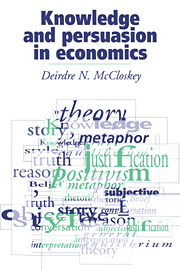Book contents
- Frontmatter
- Contents
- List of figures and tables
- Preface
- Acknowledgments
- Part I Exordium
- Part II Narration
- Part III Division
- 5 The Science word in economics
- 6 Three ways of reading economics to criticize itself
- 7 Popper and Lakatos: thin ways of reading economics
- 8 Thick readings: ethics, economics, sociology, and rhetoric
- Part IV Proof
- Part V Refutation
- Part VI Peroration
- List of works cited
- Index
5 - The Science word in economics
Published online by Cambridge University Press: 01 February 2010
- Frontmatter
- Contents
- List of figures and tables
- Preface
- Acknowledgments
- Part I Exordium
- Part II Narration
- Part III Division
- 5 The Science word in economics
- 6 Three ways of reading economics to criticize itself
- 7 Popper and Lakatos: thin ways of reading economics
- 8 Thick readings: ethics, economics, sociology, and rhetoric
- Part IV Proof
- Part V Refutation
- Part VI Peroration
- List of works cited
- Index
Summary
Economists, however, are neurotic about “science.” They think that knowing, really knowing, means following something called “scientific Method.” They think that if you don't know it that way then you don't know much.
For all their quarrelsomeness, economists know a lot. Some of it is obvious, the common sense of adults, such as that many things are scarce and that therefore we can't have everything. The postulate of scarcity is what makes economics hard to teach to young adults, who believe they live among the blessed.
But a good deal of economics is not so obvious, even to the middle aged. The sociologist Randall Collins wrote an illuminating book subtitled An Introduction to Non-Obvious Sociology (1982). His job would have been easier in economics, not because economists are superior to sociologists but because the economists have loved since the beginning all things counter, original, spare, strange. There is a genre in economics of Everything You Thought You Knew About the Economy That Is In Fact Wrong (North and Miller 1983; and Smith 1776 [1981]). Even more than other social scientists the economists love to dumbfound the bourgeoisie.
Did you think during the Oil Crisis of 1973 that the Oregon Plan, selling gasoline by license-plate number, would cut queues at service stations? Think again: it had no effect on the queues, because the queues needed to be long enough to ration out the existing supplies (which were low at the controlled price).
- Type
- Chapter
- Information
- Knowledge and Persuasion in Economics , pp. 55 - 70Publisher: Cambridge University PressPrint publication year: 1994



